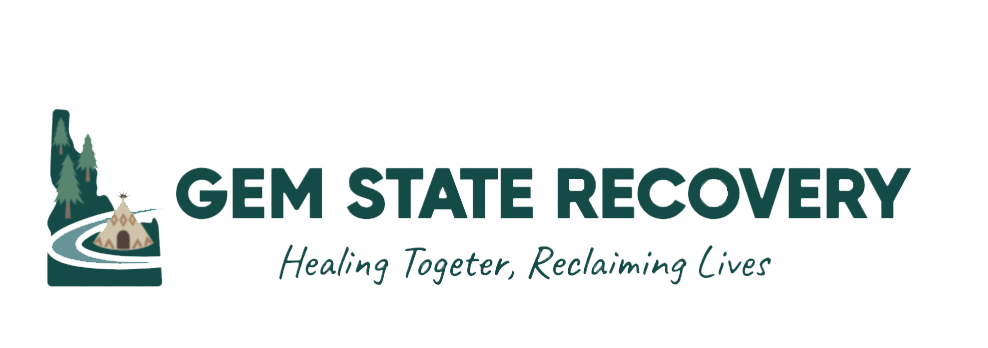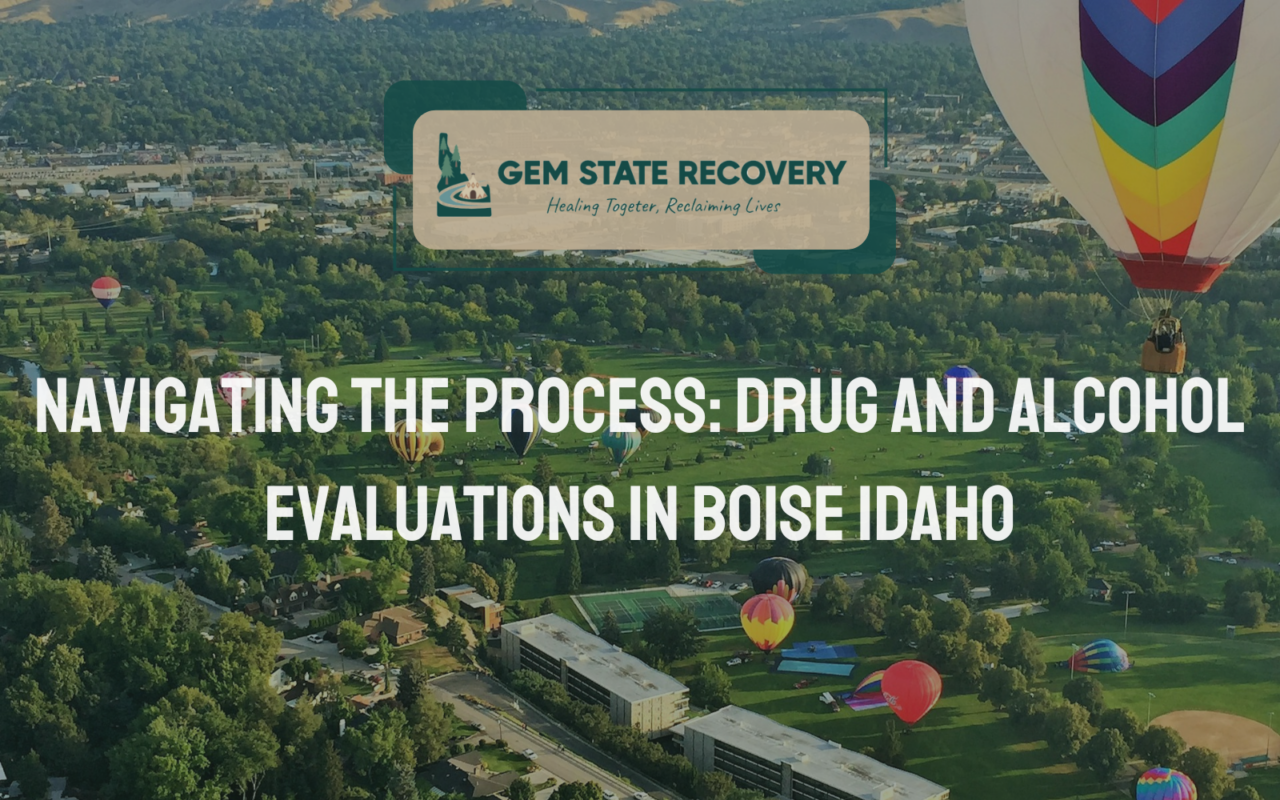Struggling with addiction can feel like you’re lost in a maze with no exit. The uncertainty, confusion, and isolation are real. But here’s the good news: you don’t have to go through it alone. A critical first step toward recovery is often a drug and alcohol evaluation in Boise Idaho. If you’re looking for guidance on this process you’re in the right place.
At Gem State Recovery, we believe that understanding what to expect can ease some of the stress associated with this crucial step. In this blog, we’ll break down everything you need to know about a drug and alcohol evaluation in Boise Idaho. We’ll explain why they’re important, what to expect during the evaluation, and how this process can pave the way to a brighter future.
What Exactly Are Drug and Alcohol Evaluations?
A drug and alcohol evaluation in Boise Idaho is an assessments performed by licensed professionals to determine the extent of substance use and how it impacts your life. These evaluations are often court-ordered, especially in cases related to DUI, substance-related offenses, or child custody matters. However, they can also be requested voluntarily as part of the first step in entering treatment programs.
At Gem State Recovery, our evaluations aim to provide a clear picture of where you stand in your battle with substance use. By identifying your specific needs, we can help guide you to the most appropriate treatment plan, ensuring that your road to recovery starts on the right foot.
These evaluations aren’t just about checking boxes—they’re designed to give you and your healthcare provider a thorough understanding of your situation, so you can tackle the issues head-on.
The Purpose of Drug and Alcohol Evaluations
You might be wondering, “Why are drug and alcohol evaluations so important?” These assessments are critical for a variety of reasons:
- Tailored Treatment Plans: Everyone’s recovery journey is unique. Evaluations help professionals tailor a treatment plan specific to your needs, ensuring the best possible outcome.
- Legal Compliance: In many cases, courts require evaluations to assess the seriousness of an individual’s substance use and to guide sentencing or probation conditions.
- Personal Awareness: Evaluations give individuals a better understanding of their substance use patterns and the ways in which it affects their life, relationships, and health.
- Access to Resources: These evaluations help connect you to the appropriate resources, such as detox programs, therapy, support groups, or inpatient treatment.
Who Needs a Drug and Alcohol Evaluation?
Evaluations are often required for individuals involved in various legal or personal situations, including:
- Court-Ordered Evaluations: These are common in cases related to DUI/DWI charges, public intoxication, possession, or any other drug- or alcohol-related legal trouble. The evaluation serves as a way for the court to determine the appropriate next steps, whether that’s treatment, education classes, or another intervention.
- Workplace Requirements: Some employers require drug and alcohol evaluation in Boise Idaho to ensure the safety and well-being of their employees. In industries where safety is a major concern (e.g., transportation, healthcare, construction), employers may ask for an evaluation if there are concerns about substance abuse.
- Child Custody and Family Court: In custody battles or divorce cases, a drug and alcohol evaluation in Boise Idaho may be required to assess a parent’s ability to provide a safe and stable environment for their children. Judges often use these evaluations to make informed decisions regarding child welfare.
- Personal Initiative: Many people also seek out evaluations on their own as a proactive step toward recovery. Whether you’re concerned about your own substance use or have had loved ones express their concerns, a voluntary evaluation can provide valuable insights and direction for treatment.
What Happens During a Drug and Alcohol Evaluation in Boise Idaho?
The evaluation process typically involves two main components: an in-depth interview and a standardized questionnaire. Here’s a quick breakdown of what to expect:
- In-Depth Interview: A licensed counselor or evaluator will sit down with you to discuss your history of substance use. This conversation may cover topics like:
-
- The frequency and amount of drug or alcohol consumption
- The impact substance use has had on your personal and professional life
- Any previous treatment or attempts at sobriety
- Your mental health, including any co-occurring disorders
- This part of the evaluation is your opportunity to be open and honest about your experience. Don’t worry—this is a judgment-free zone. At Gem State Recovery, our goal is to understand your situation thoroughly so we can support you moving forward.
- Standardized Questionnaire: You’ll also complete a standardized assessment tool, like the Addiction Severity Index (ASI) or the Substance Abuse Subtle Screening Inventory (SASSI). These questionnaires measure the severity of your substance use and help paint a clearer picture of where you’re at.
- Screenings and Tests: In some cases, a drug test or medical evaluation may be required. This could involve a urine sample or other forms of screening to confirm recent substance use.
After these steps, the counselor will compile all the information and develop a recommendation. This could range from enrolling in an outpatient program to more intensive treatment options like inpatient rehab, depending on the severity of your substance use.
What Do Drug and Alcohol Evaluations Assess?
Evaluations are designed to be comprehensive. They assess multiple areas of a person’s life to create a full picture of how substance use may be impacting them. Some key areas that an evaluator will explore include:
- Substance Use History: How long have you been using substances, and at what frequency? Have you attempted to quit before? These are questions the evaluator will dive into to get a sense of your substance use patterns.
- Medical History: Substance abuse can take a toll on your physical health. Evaluators will inquire about any medical issues, past surgeries, or health conditions that may be exacerbated by drug or alcohol use.
- Mental Health: Co-occurring disorders, such as anxiety, depression, PTSD, or bipolar disorder, are common among individuals with substance use disorders. Evaluators will assess your mental health to determine if dual diagnosis treatment is necessary.
- Social and Occupational Impact: Evaluators will also explore the impact your substance use has had on your relationships, job performance, and social interactions. Have you lost jobs due to substance use? Has it caused strain with friends or family?
- Legal Issues: If you have legal troubles connected to substance use, such as DUI charges or arrests, this will be an important part of the evaluation. Your evaluator will need to understand the full context of any legal entanglements to provide the best recommendations.
The Importance of Being Honest During the Evaluation
One of the most important things to remember during a drug and alcohol evaluation in Boise Idaho is the need for honesty. It can be tempting to downplay certain behaviors or deny how deeply substance use has affected your life, but transparency is crucial for effective treatment.
At Gem State Recovery, we strive to create a non-judgmental and supportive atmosphere during evaluations. This is your opportunity to receive the help you need, so being open about your experiences will ensure that the treatment recommendations you receive are well-suited to your unique situation.
The Legal Side of a Drug and Alcohol Evaluation in Boise Idaho
If your evaluation is court-ordered, you may have specific deadlines or documentation requirements. It’s important to follow these guidelines carefully to avoid any additional legal complications. At Gem State Recovery, we help you navigate these legal waters by providing thorough, timely, and professional evaluations that meet the requirements of Boise, Idaho’s courts and legal system.
Whether your evaluation is tied to a DUI case, probation conditions, or a custody dispute, rest assured that Gem State Recovery has experience working with courts, attorneys, and probation officers. We ensure that your evaluation is handled with the utmost care and professionalism.

Post-Evaluation: What Happens Next?
After your drug and alcohol evaluation in Boise Idaho is complete, you’ll receive a comprehensive report that outlines the findings and recommended next steps. Here’s what you can typically expect:
- Detailed Findings: The evaluator will summarize their findings, detailing the severity of your substance use, any underlying issues that may be contributing to your addiction, and how these factors are affecting your life.
- Treatment Recommendations: Based on the evaluation, the counselor will recommend a course of action. This could include:
-
- Outpatient Counseling: This option may be suggested if your evaluation indicates mild to moderate substance use. Outpatient counseling involves regular sessions with a therapist or counselor, typically scheduled weekly or bi-weekly. This format allows you to continue living at home, maintaining your work or school commitments, and fulfilling daily responsibilities while receiving support and guidance to address your substance use.
- Intensive Outpatient Programs (IOP): If your substance use is more severe but doesn’t require inpatient care, an IOP may be recommended. These programs offer a higher level of care than traditional outpatient counseling, often including several hours of therapy per week. Participants engage in group and individual therapy sessions, which provide a supportive environment for recovery while still allowing you to return home each day, thus balancing treatment with everyday life.
- Inpatient Rehab: For individuals with severe substance use disorders, inpatient treatment may be necessary. Inpatient rehab provides around-the-clock support in a structured environment specifically designed for recovery. This setting focuses on detoxification, therapy, and relapse prevention strategies, offering medical supervision and emotional support to help individuals navigate the challenges of withdrawal and early recovery.
- Support Groups: Groups like Alcoholics Anonymous (AA) or Narcotics Anonymous (NA) may be recommended as part of your aftercare plan. These support groups create a community of individuals who share similar experiences and struggles, offering peer support and accountability. By participating in regular meetings, members can share their stories, gain insights from others, and build a network that encourages maintaining sobriety.
- Detox: In cases of severe substance use, detoxification in a medically supervised facility may be the first step before starting any counseling or therapy. Detox is crucial to safely manage withdrawal symptoms and prepare the body for further treatment. During this process, healthcare professionals monitor your condition and provide necessary medical interventions to ensure a safe transition into recovery.
- Legal Follow-Up: If your evaluation was court-ordered, the results will likely be sent to the appropriate legal authorities (e.g., your attorney, probation officer, or judge). Be sure to follow through with any recommended treatment or courses of action to comply with court requirements.
FAQs About a Drug and Alcohol Evaluation in Boise Idaho
1. How long does a drug and alcohol evaluation take?
The evaluation typically lasts between one to two hours, depending on your individual case and the amount of information needed.
2. Can I fail a drug and alcohol evaluation in Boise Idaho?
No, you can’t “fail” an evaluation. The purpose is to assess your situation and provide the best recommendations for treatment, not to pass judgment.
3. Will my evaluation results be confidential?
Yes. Your privacy is protected by law, and your evaluation results are confidential unless you give permission to share them with specific parties, such as a court or employer.
4. How much does a drug and alcohol evaluation in Boise Idaho cost?
Costs vary depending on the provider and the complexity of the evaluation, but at Gem State Recovery, we strive to keep our services affordable and can discuss payment options with you.
5. What happens if I don’t follow the recommendations from the evaluation?
If your evaluation was court-ordered, failure to follow the recommendations could result in legal consequences, such as fines, extended probation, or even jail time. If the evaluation was voluntary, you’re not obligated to follow the recommendations, but doing so will increase your chances of successfully overcoming substance abuse.
Taking the Next Step with Gem State Recovery
If you or someone you know is facing a drug or alcohol evaluation, we understand that it can be a daunting process. But remember, it’s a necessary step toward recovery, and it doesn’t have to be something you face alone.
At Gem State Recovery, we’re committed to helping you navigate this journey with compassion and understanding. We offer a professional drug and alcohol evaluation in Boise Idaho, and work with you every step of the way to ensure you’re getting the care and support you need.
Taking that first step can feel overwhelming, but trust us when we say it’s worth it. Let us help guide you toward a brighter, healthier future. For more information call us at (208) 314-3107 or visit our website https://gemstaterecovery.com/.





